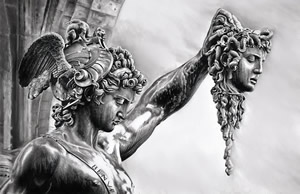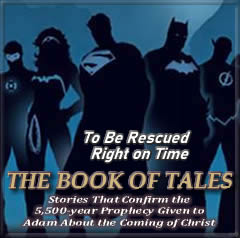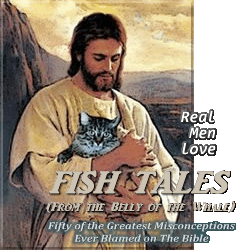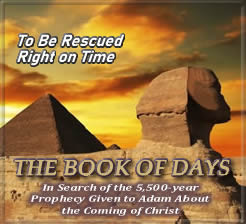A Hero for the Ages (Cont’d)
The Secret Desire
Whether or not one believes in God or The Bible, all human beings cling to a curious desire to believe in otherworldly possibilities. The believer has faith in his God of Scripture, while the atheist believes in his Big Bang of science. In both cases, however, the very same mechanism is at work. Something inside each of us is calling out to some corresponding mystery imbedded in the Universe in which we live. We sense it implicitly, and because of this peculiar sensation, we all set out in pursuit of whatever might substantiate this haunting sense of “knowing something” that is beyond our mortal selves.
That said, I would like to take some time to demonstrate how this principle of “knowing” is presently at work in the lives of everyone around us, whether in those who believe in The Bible or in those who reject it. Furthermore, I will do so by way of another of the ideas already outlined in this work, namely, that the God of Scripture speaks to mankind via the dramatic narratives of The Bible because we are creatures that are uniquely tuned to such modes of communication. Therefore, if we as human beings have been created this way, then regardless of our specific belief systems we should find that we all reveal a similar reaction to this thing we call “storytelling.” In this, I suppose, anthropologists and psychologists might describe it another way. Human beings, they might postulate, prior to the development of verbal skills, were predisposed to respond to symbolic modes of information, whether in the form of allegory, metaphor, or myth. As such it is simply a fact of life that we humans, as a species, respond—though, quite arguably, in ways both endearing and disturbing.
The most obvious example of this phenomenon can be seen in the universal response to the mythmaking process that began in the earliest days of movie-making at the turn of the twentieth century, particularly as it was found in a place called Hollywood. Reaching its zenith in the golden era of the 1930s, the “dream factory,” as it was dubbed, has ever since—in response to changes in public taste—adeptly alternated between fact and fiction, between drama and melodrama, between the heroic and the anti-heroic. Although it is by no means the only source for motion pictures throughout the world, Hollywood is still widely considered to be the primary cauldron of filmic mythmaking, even as it has endured such worldwide changes as world war and the global religious and economic strife of the twentieth century and beyond.
Story Continues Below
To hear Kent and Zen continue their discussion concerning the implications of the 5,500-year chronology from Adam to Christ as it pertains to the faithfulness of God, CLICK BELOW.
Story Continues From Above
In many ways, the enduring popularity of movies constitutes one of the most peculiar conundrums known to modern man. It is truly ironic when one considers the fact that this most modern of art forms should enflame so effortlessly the most ancient of ideologies. In a world that prides itself in rationalism and enlightenment, the typical moviegoer rarely objects to the sort of sentimentality and nostalgia that constitutes the primary output of this infamous dream factory, with its preponderance for such “superstitious nonsense” as destiny and redemption, resurrection and immortality, eternal love and self-sacrifice. Just imagine what the movies would be like if there were no monsters or saviors, no aliens or angels, no overlords or freedom-fighters to inhabit the screen. And what if there was no Heaven or God to gaze upon, no Hell or devil to avert our eyes from?
Even while audiences grow weary of worn-out clichés, the demand for more realistic depictions of the world has never quenched the more compelling urge—the secret desire in everyone—to be transported to alternate worlds of existence, where the movie experience becomes for them nothing less than a religious experience. Just consider the box office receipts for the top grossing films of all time, and one will notice a consistent pattern—no doubt exacerbated by Hollywood’s reluctance to stray from anything that fails to generate boatloads of cash. In the context of our discussion, however, it is even more telling when one examines this list against the backdrop of the narratives found in The Bible.
The Power of One
Without exhausting the endless possibilities, a cursory comparison would certainly have to begin with the most mythic of all such motifs—that of the power of “one man.” Undoubtedly, the most pervasive story element found in Scripture is that of one man who rises from the muddled masses, one man who alone possesses the skill, the courage, and the sense of destiny to save the day. The roll call of such iconic heroes fills the pages of both Holy Writ and Hollywood. For every Noah, Moses, or David offered up in The Bible, there is a James Bond, Luke Skywalker, or Harry Potter among the pantheon of movie gods. When former President Ronald Reagan was asked about what film had most affected him, he cited Mr. Smith Goes to Washington.
When Jimmy Stewart walked the halls of the Capitol building, I walked with him. When he stood in awe of that great man at the Lincoln Memorial, I bowed my head, too. When he stood in the Senate chamber and refused to knuckle under to the vested interests, I began to realize, through the power of the motion picture, one man can make a difference.1
In describing what Frank Capra, the director of the film, had done through his hero, film critic Neal Gabler wrote, “He created a powerful myth for the nation.”2 This myth, however, was not created out of thin air. It was, in fact, firmly rooted in those narratives found originally in The Bible. “Capra had propounded,” Gabler went on to say, “a theology of comedy—a secularized displacement of Christ’s tale, in which the common-man hero, blessed with goodness and sense, overcomes obstacles, temptations, and even betrayals to redeem his own life and triumph.”3
Clearly, without such heroic figures for audiences to root for, movie producers would be sorely lacking the single most important ingredient that keeps people coming back again and again to see the same kinds of movies. Notwithstanding the fact that such things rarely happen in real life, as long as there is some sort of anchor, that is to say, an explicitly human anchor, to support such mythical motifs, then all the better. And what better “myth” is there to be found than in the pages of the most published book of all time; as famed American film director Cecil B. DeMille once observed: “Give me two pages from The Bible, and I’ll give you a motion picture.” Of course, Mr. DeMille—who directed such films as The King of Kings, The Sign of the Cross, and Samson and Delilah—could never have anticipated the way in which future filmmakers would take the familiar heroes of old and, through a classic bit of Hollywood “rewriting,” transform them into heroes for a new generation.
Batman, Spider-Man, Iron Man, X-Men, Superman, Men in Black, and James Bond: Besides representing seven of the all-time highest grossing film franchises in history, what do all these characters have in common? And more importantly, in view of what we are seeking to demonstrate in this work: What do these characters have in common with the narratives that are showcased in the most ancient form of dramatic narrative known to humanity? In a nutshell: They all portray a troubled world that is powerless to resist the overwhelming forces imposed upon it by various personifications of evil—both natural and supernatural. Next, enter into that world some special “one,” who has been separated, equipped, and trained to perform a task that no one else is capable of. Then, through the selfless action of this someone—this one man, this one woman, this, dare I say, lone messianic figure—is the archenemy of mankind defeated and the scales of justice set right. Otherwise, without the personal intervention of this hero of biblical proportions, the world would surely remain trapped forever in the clutches of darkness and despair.







